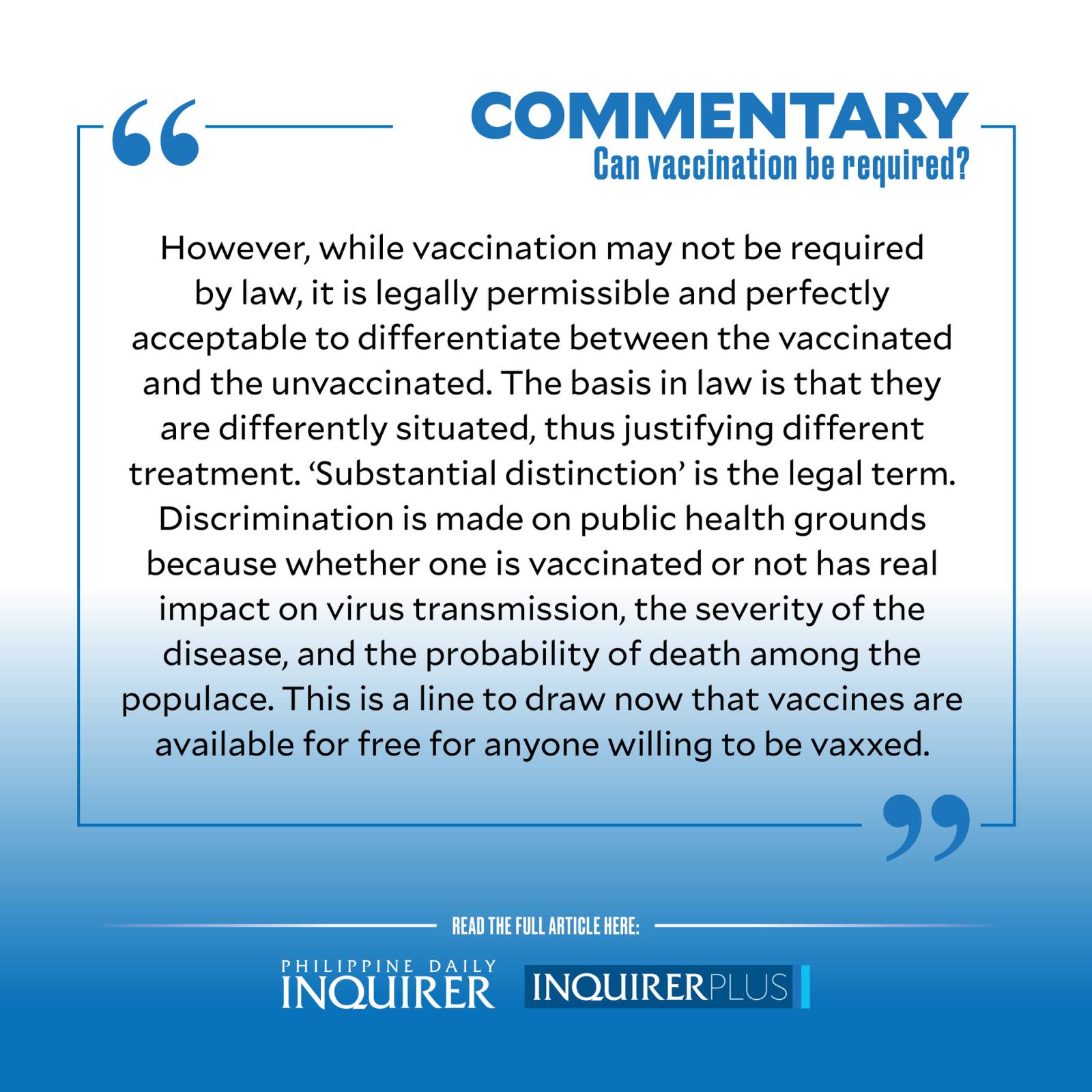Can vaccination be required?
It is not known to many, but there is actually a law in the country that makes vaccination compulsory. Republic Act No. 10152, passed in 2011, is “An Act providing for Mandatory Basic Immunization for Infants and Children.” Take note of the key words: mandatory as in required, basic immunization against vaccine-preventable diseases, and infants and children up to five years old.
It cites the Constitutional policy that “the State shall protect and promote the right to health of the people and instill health consciousness among them,” and proceeds to declare that the State shall take a proactive role in the preventive health care of infants and children as justification for a comprehensive, mandatory, and sustainable immunization program for them.
Article continues after this advertisementThis requirement to vaccinate was hardly noticed or did not raise any protests. The law was passed 10 years before the 2020 pandemic and prior to the 2018 Dengvaxia controversy. There is no penalty provision in the law. We grew up with immunizations, as evidenced by the scars on our arms and bums.
The vaccinations were for diseases such as tuberculosis and tetanus, polio and mumps, measles and German measles, hepatitis-B and H. influenza type B. The vaccines administered have been scientifically and historically proven to be safe and effective. The list of mandated vaccines changes and expands over time. For example, in 2012, vaccination against rotavirus and streptococcus bacteria was included in the National Immunization Program of the Department of Health. Another component is the vaccination of seniors who routinely get their flu and pneumonia shots.
Still, even with this law, there are three objections to requiring vaccination against COVID-19. One, this coronavirus is a very new pathogen that needs to be studied and understood more. The current vaccines use different technologies, with their efficacy said to range from 50 percent to 90 percent and with varied side effects. The science in the development and testing of the drugs may be sound, but without the benefit of a longitudinal study, it will take time for COVID-19 vaccines to become widely acceptable and be part of routine immunization. There is cause to be cautious.
Article continues after this advertisementTwo, the vaccines are allowed under emergency use authorization. The Food and Drug Administration allows the use of an unapproved product after outweighing the pros against the cons based on available data. It means that the vaccines have not completed all the phases of clinical trials required, and are considered to be in the experimental stage. How can a drug on trial basis be mandated?
Three, individuals have a right to refuse. To require jabs by legislation or regulation will violate individual freedom. Regardless of the reason, whether it be God, the Bible, alternative facts, or belief in a conspiracy theory, anti-vaxxers are fundamentally correct in their stand that injections cannot be forced upon people. Contrast this with the requirement of face shields and masks that does not intrude on personal rights at the same level.
However, while vaccination may not be required by law, it is legally permissible and perfectly acceptable to differentiate between the vaccinated and the unvaccinated. The basis in law is that they are differently situated, thus justifying different treatment. “Substantial distinction” is the legal term. Discrimination is made on public health grounds because whether one is vaccinated or not has real impact on virus transmission, the severity of the disease, and the probability of death among the populace. This is a line to draw now that vaccines are available for free for anyone willing to be vaxxed.
Hence, government can declare that only the vaccinated can enter government buildings; or employers can hire and retain vaccinated workers, especially in frontline sectors like restaurants and salons or those in compact settings like assembly lines or BPO offices. Operators of private property for public use like malls, hotels, and zoos should choose those already vaccinated to interact with patrons. It makes health and business sense for vaccinated workers to serve vaccinated consumers and for such clients to support these establishments.
It is a simple and virtuous cycle that can be readily adopted and implemented. One is not forced or coerced, but as in any life choice, there are consequences to the decision not to be vaccinated. The pandemic will be less fearsome, less injurious, and more manageable when we refresh our mindset. The pandemic is over the day we see COVID-19 as endemic to human existence—like the list of vaccine-preventable diseases we are protected against.
Let us not mandate vaccination. But surely, we can require reasonable conditions and demand equitable actions that are safe, effective, and economical.
——————
Geronimo L. Sy is a former assistant secretary of the Department of Justice.

















